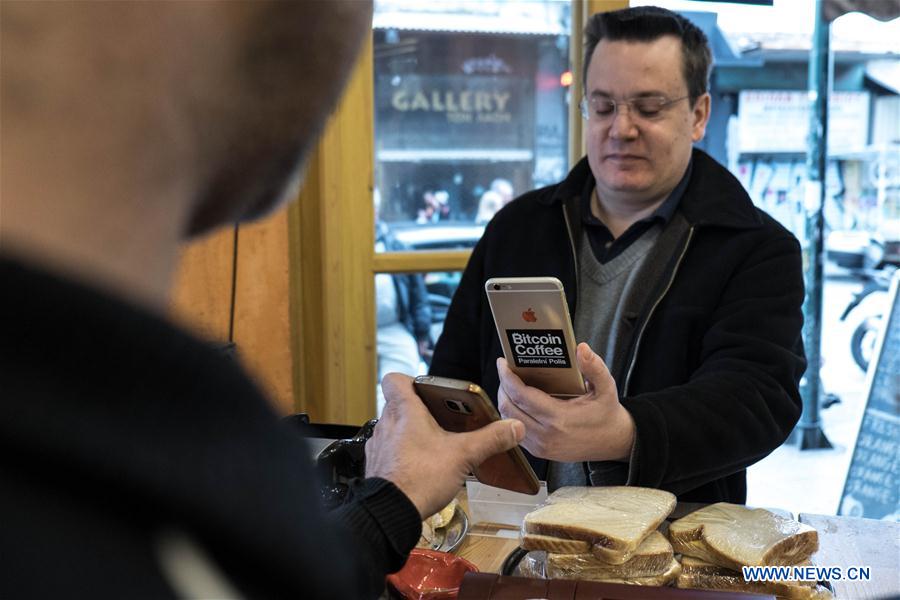
A customer uses his mobile phone to pay with bitcoin at a coffee shop in the center of Athens, Greece, Feb. 25, 2018. Greece's bitcoin community grows in recent years, buoyed by the capital controls imposed on the traditional banking system since the summer of 2015, users and investors told Xinhua, although local authorities warn about the risks of crypto currencies. (Xinhua/Lefteris Partsalis).
by Maria Spiliopoulou, Valentini Anagnostopoulou
ATHENS, Feb. 28 ((Xinhua) -- Greece's bitcoin community grows in recent years, buoyed by the capital controls imposed on the traditional banking system since the summer of 2015, users and investors told Xinhua, although local authorities warn about the risks of crypto currencies.
In a small cafe near the Acropolis hill in the center of Athens, Dimitris Tsapakidis is buying a coffee using his mobile to pay with bitcoin.
Tsapakidis, with a background in mathematics, computer science and information security, is one of the co-organizers of the bitcoin community in Athens. He is into crypto currencies over the past two decades.
Vassilis Papadopoulos, the cafe's owner, is comparatively new in the community. He placed the welcome sign "bitcoin accepted here" a year ago, and said a lot of the transactions in Greece are from tourists.
There are at least 2,000 people all over Greece interested in bitcoin and crypto currencies that have registered with the community and attend regular meetings asking for information or are already making transactions, Tsapakidis told Xinhua.
They include young tech savvies and grey-haired professionals. There are about 70 businesses accepting bitcoin and other crypto currencies as a means of payment nationwide, ranging from restaurants and coffee shops to dentists and lawyers, as well as bitcoin ATMs.
The numbers are quite high compared to other countries, Tsapakidis noted, attributing crypto currencies' growing popularity in Greece partly to the capital controls imposed amid the debt crisis to avert the collapse of the traditional banking system.
The capital controls have gradually loosened ever since, but with the restrictions many Greeks sought and seek alternative paths.
"There was an explosion in interest for bitcoin in Greece in the middle of 2015, when we had capital controls in Greece and when the banks closed. A lot of people were interested because they couldn't use the money in the banks. A few people also had to make payments abroad and the only way to make payments abroad at the time was with bitcoin and crypto currencies," Tsapakidis explained.
Media reports about bitcoin's meteoric rise in 2017 to over 10,000 U.S. dollars also intrigued people and more Greeks turned to the community asking for information, he said.
Tsapakidis has invested in bitcoin which first circulated in 2009, after weighing up the advantages and disadvantages.
"I got involved in crypto currencies about 20 years ago, when we had some early crypto currencies, but were centralized and they all failed. The innovation of bitcoin and other crypto currencies is that they are decentralized. That is what makes them survive. There is no single bank that issues crypto currencies," he explained.
Tsapakidis is more than happy that for the first time it is possible for people to exchange value without anyone being in control. One can make an almost instant transfer across borders with a very low fee without having to ask any permission.
However, this lack of control and inspection by authorities so far, for the critics of crypto currencies, is the biggest warning sign.
As most countries across the globe have still not set up a clear legal framework to ban or regulate the digital currency, bankers and other representatives of the mainstream financial system worldwide warn that investors in virtual currencies are facing a pricing bubble risk and losses without a minimum safety net.
"This is a bubble which serves no need and poses great risks for citizens who are attracted by the promise of making easy profit... We warn consumers to stay away from such trading to protect themselves," Haralambos Gotsis, President of the Hellenic Capital Markets Commission, said in a statement earlier this month.
He pointed to a similar joint warning issued by the European Securities and Markets Authority (ESMA), the European Banking Authority (EBA) and the European Insurance and Occupational Pensions Authority (EIOPA) on the high risks of buying and holding the so-called Virtual Currencies (VCs).
"The VCs currently available are a digital representation of value that is neither issued nor guaranteed by a central bank or public authority and does not have the legal status of currency or money. They are highly risky, generally not backed by any tangible assets and unregulated under EU law, and do not, therefore, offer any legal protection to consumers," they warned.
Tsapakidis acknowledges the issue of bitcoin's extreme price volatility. Within a year it went up about 19 times and then dropped in half.
"It is a little early to guess what would happen. Greece will follow what happens in Europe in terms of law. So a lot depends on how the EU governments will decide to treat crypto currencies, whether they will make it an acceptable form of payment, depends on how they will tax it. Right now it acts more like a store value, not as a form of payments (for Greeks)," he said.















